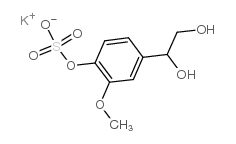| Structure | Name/CAS No. | Articles |
|---|---|---|
 |
4-Hydroxy-3-methoxyphenylglycol sulfate potassium salt
CAS:71324-20-4 |
E T Hellriegel, A P D'Mello
Index: Pharmacol. Biochem. Behav. 57 , 207-214, (1997)
Full Text: HTML
The objective of this investigation was to examine the immediate and long term effects of acute, chronic and chronic intermittent stress on the central noradrenergic system of rats. Male Sprague-Dawley rats were subjected to one hour of physical immobilization stress either as a single exposure, or as 14 exposures applied either on consecutive days, or randomly over 60 days. Animals were sacrificed immediately, 6 h and 24 h following the last stressor. Levels of norepinephrine (NE) and 3-methoxy-4-hydroxyphenylethylene-glycol sulfate (MHPG-sulfate) were measured in the hypothalamus, hippocampus, cerebral cortex and locus coeruleus region and beta-adrenergic receptor (BAR) density was determined in the cortex. Immediately after acute stress, a significant reduction in hypothalamic NE levels and marked increases in MHPG-sulfate levels in all four brain regions were observed. In contrast immediately after the last stressor of a chronic or chronic intermittent stress regimen, no change in NE concentration was observed while levels of MHPG-sulfate in the four brain regions showed a smaller increase than that observed after an acute stressor. Acute stress induced changes normalized within 6 h while chronic and chronic intermittently stressed animals had altered NE or MHPG-sulfate levels in certain brain regions for up to 6-24 h. Cortical BAR binding parameters remained unchanged after all stress paradigms.
| Structure | Name/CAS No. | Molecular Formula | Articles |
|---|---|---|---|
 |
4-Hydroxy-3-methoxyphenylglycol sulfate potassium salt
CAS:71324-20-4 |
C9H11KO7S |
|
Chemical genetics reveals a complex functional ground state ...
2007-05-01 [Nat. Chem. Biol. 3(5) , 268-273, (2007)] |
|
Mesenteric organ production, hepatic metabolism, and renal e...
1996-04-01 [J. Neurochem. 66 , 1573, (1996)] |
|
Fluoxetine increases norepinephrine release in rat hypothala...
1997-01-01 [J. Neural Transm. Gen. Sect. 104 , 953-966, (1997)] |
Home | MSDS/SDS Database Search | Journals | Product Classification | Biologically Active Compounds | Selling Leads | About Us | Disclaimer
Copyright © 2024 ChemSrc All Rights Reserved